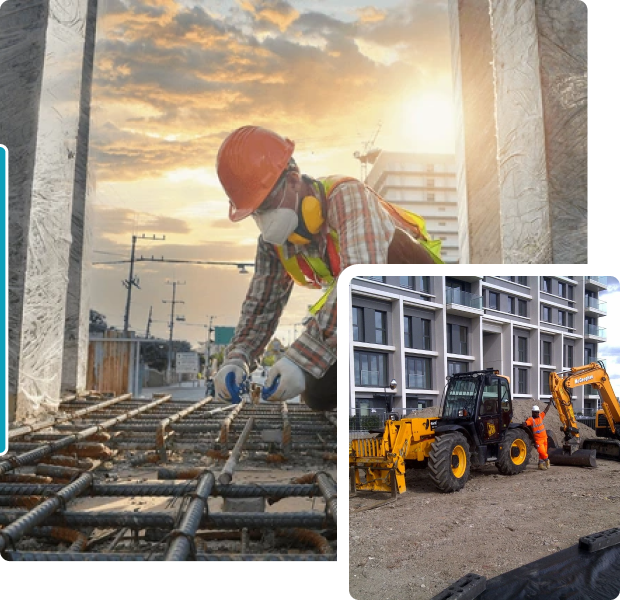Home > Courses > NVQ in Trade Occupations > Wall and Floor Tiling

Wall and Floor Tiling
The Certificate will develop knowledge and skills in areas such as general health, safety and welfare; productive working practices; and moving, handling and storing resources. Learners can specialise in preparing backgrounds to receive wall and/or floor tiling, and tiling wall and floor surfaces.
This qualification covers the following areas:
Course Objectives
The qualification is designed to meet the following objectives:
Recognition
This qualification is supported by the Construction Skills Certification Scheme (CSCS).
CSCS provides a registration card scheme acknowledged by industry for those involved in construction. The scheme recognises skills, knowledge and understanding, competence and qualifications.

Rationale and Purpose of this Qualification
The qualification is aimed at those who are in work and are looking for recognition of their prior learning and experience in their chosen industry.
The primary purpose of this qualification is to confirm the learner’s occupational competence as a Tiler. Completing this work-related, competence-based qualification will provide confirmation to employers, industry managers and card schemes that learners have the skills and knowledge needed to meet the national standard to carry out the role of a Wall and Floor Tiler.
Learners can build on the skills and knowledge gained from achievement of this qualification when working towards achieving another qualification or gaining employment.
It is intended that the qualification will allow learners to evidence experience of topics based on accepted and recognised industrial practices. The Certificate will provide a sound basis for advancing in the industry for a range of potential learners.
The qualification is assessed through a portfolio of evidence which details what learners have completed at work through a variety of evidence such as observation, professional discussion, witness testimony and supporting documentary evidence. The assessor can work alongside the learner to confirm that they have met the requirements of the qualification and that they are therefore competent in their role.
Assessors will observe the learner carrying out their normal work activities to show they can do this competently and to the industry standard and that they can comply with currently legislation and company procedures.
The assessment process will ensure that the learner can complete the tasks that they have been directed to undertake and that they can interpret the instructions correctly. They will demonstrate that they can select the appropriate resources for the task. They will also show that they can complete tasks within the given timescales and specifications.

What does this Qualification Cover?
As this is a competence-based qualification, learners will be acquiring the knowledge and skills required through either on-the-job experience or in a learning environment.
This qualification has a range of pathways linked to typical job roles that learners will encounter within the industry.
To achieve the whole qualification learners need a minimum of 31 credits. They must complete 5 mandatory units from the qualification structure.
This qualification is mainly taken by individuals employed as: Tiler
Lorem Ipsum is simply dummy text of the printing and typesetting industry. Lorem Ipsum has been the industry’s standard dummy text ever since the 1500s, when an unknown printer took a

An NVQ (National Vocational Qualification) is a competence-based assessment of the skills, knowledge, and experience you already have. It’s designed for professionals who have learned ‘on the job’ over years and are established in their role but lack formal recognition of their skills. NVQs prove to an assessor that you carry out your job safely, effectively, and in line with industry standards.
No. NVQs don’t involve exams or trick questions. They’re designed for practical people who have developed their skills in a real working environment. The only test required is the CITB Health Safety and Environment test, which is needed for your CSCS card application after completing the NVQ.
No prior qualifications are necessary. You could go from having no qualifications to achieving a Level 7 NVQ (the highest competence-based qualification in Construction). The key is proving that you’re already working at the required level and have been in the job for an appropriate amount of time.
The timeframe largely depends on your motivation. We provide support for 12 months, but qualifications are typically achievable within 1-3 months.
Yes, CITB registered employers can claim up to £1500 per candidate on achievement of our construction-specific qualifications. As of April 1, 2023, the grant amounts are:
Our assessors are highly experienced, qualified construction professionals who have done the job themselves. We carefully select a particular assessor for each learner to ensure that workplace experiences are aligned and that feedback and guidance are useful, relevant, and rewarding.
The NVQ assessment is a comprehensive process that evaluates your skills, knowledge, and experience in your field without requiring site visits or time off work. It involves several methods to assess your competence, including a practical skills assessment, review of evidence (such as method statements, risk assessments, toolbox talks, time sheets, inspection reports, videos, and photographs), a knowledge-based assessment, professional discussions with your assessor, and witness testimony from colleagues or supervisors.





Samad Solutions Ltd are a construction Industry supplier delivering National Vocational Qualifications (NVQs) and Construction related courses.
Company
Courses
Others
Location
Copyright 2016-24 © Samad Solutions ltd. All Rights Reserved